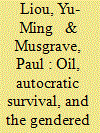|
|
|
Sort Order |
|
|
|
Items / Page
|
|
|
|
|
|
|
| Srl | Item |
| 1 |
ID:
166755


|
|
|
|
|
| Summary/Abstract |
Many international-relations scholars assume that stronger states get their way in world politics. The books reviewed here provide a coherent research program that challenges that notion. By treating asymmetrical international relations as an analytical category distinct from relations attaining among peer states, the authors make theoretical and empirical progress in addressing puzzles about why stronger states do not always prevail. These contributions matter for students of small-state foreign policy, of U.S. foreign policy, and of international hierarchy. This essay describes and reviews the new research program while showing how it could build connections to the literature on hierarchy and international relations.
|
|
|
|
|
|
|
|
|
|
|
|
|
|
|
|
| 2 |
ID:
192522


|
|
|
|
|
| Summary/Abstract |
Zero-day vulnerabilities are software and hardware flaws that are unknown to computer vendors. As powerful means of carrying out cyber intrusions, such vulnerabilities present a dilemma for governments. Actors that develop or procure such vulnerabilities may retain them for future use; alternatively, agencies possessing such vulnerabilities may disclose the flaws to affected vendors so they can be patched, thereby denying vulnerabilities not only to adversaries but also themselves. Previous research has explored the ethics and implications of this dilemma, but no study has investigated public opinion regarding zero-day exploits. We present results from a survey experiment testing whether conditions identified as important in the literature influence respondents’ support for disclosing or stockpiling zero-day vulnerabilities. Our results show that respondents overwhelmingly support disclosure, a conclusion only weakly affected by the likelihood that an adversary will independently discover the vulnerability. Our findings suggest a gap between public preferences and current U.S. policy.
|
|
|
|
|
|
|
|
|
|
|
|
|
|
|
|
| 3 |
ID:
142804


|
|
|
|
|
| Summary/Abstract |
For decades, China has been countering U.S. naval strengths with asymmetric capabilities, not by matching them. Yet, China is now building aircraft carriers. Why? It is not a sign of strength but rather history is replete with examples, including two from the Cold War, of weaker states imitating more advanced rivals rather than pursuing their own “disruptive” innovations.
|
|
|
|
|
|
|
|
|
|
|
|
|
|
|
|
| 4 |
ID:
168921


|
|
|
|
|
| Summary/Abstract |
Many theories of hegemonic orders assume that systemic incentives will discipline the hegemon to maintain a status quo policy supporting that order. These theories make too strong a claim that domestic actors will not see any self-interested gain in opposing hegemony or strategies necessary for hegemony. Yet policies sustaining hegemony are unlikely to remain perpetually exempt from domestic political contestation. Indeed, US political institutions—especially political parties—may provide incentives for actors to undermine hegemony in order to reward their core constituencies or to distinguish their electoral brand from a rival party. Whether by producing overt policy shocks, through diminished expectations of gains from future cooperation by other states, or some combination of the two, these processes can erode the foundations of hegemonic order. This threat to international order has been illustrated by the 2016 US election, but the conditions that produced that result were present long before and would have persisted regardless of the outcome.
|
|
|
|
|
|
|
|
|
|
|
|
|
|
|
|
| 5 |
ID:
111963


|
|
|
|
|
| Publication |
2012.
|
| Summary/Abstract |
Many observers have argued that social media such as Facebook and Twitter will help opposition activists coordinate and overcome authoritarian regimes; others believe that such tools will have little impact. Evidence from the "Arab Spring" is inconclusive, with advocates for each position finding support in the events in Tunisia, Egypt, and elsewhere. When does social media help political movements succeed? Motivated by an experience serving as a "campaign manager" for a colleague's bid to become the Washington Post's "Next Great Pundit," I argue that relying on Internet-based social networking tools (such as Facebook and Twitter) may lead campaigns to perform more poorly when the regime is able to change the election's rules in mid-campaign. Consequently, researchers observing only the messages broadcast by social media will miss the true coordination taking place, which happens through channels unobservable to the regime. Examples from Middle Eastern politics suggest that real-world political activists recognize these distinctions and adjust their messaging accordingly.
|
|
|
|
|
|
|
|
|
|
|
|
|
|
|
|
| 6 |
ID:
190756


|
|
|
|
|
| Summary/Abstract |
Foreign electoral interventions have attracted greater attention since the Russian intervention in the 2016 U.S. elections. Even though the United States has a long history of intervening in other countries’ elections, evidence about what drives public support for U.S. foreign electoral intervention is scarce. This paper uses a new set of surveys and experiments to test hypotheses about what drives the American public’s views of U.S. electoral interventions abroad. We find that there is no taboo against such U.S. interference in the American public. However, public support for U.S. election interference is not automatic. Respondents do not support interventions solely to advance U.S. interests or to protect democracy, although they prove more supportive of interventions on behalf of democratic parties that also favor U.S. interests or to protect longstanding democracies. Finally, support for an intervention rises when it is framed as responding to the actions of a great-power rival such as Russia.
|
|
|
|
|
|
|
|
|
|
|
|
|
|
|
|
| 7 |
ID:
148032


|
|
|
|
|
| Summary/Abstract |
Economic development generally promotes women’s autonomy. Yet women in resource-rich autocracies fare more poorly than women in similarly wealthy industrial and postindustrial states. Some attribute this puzzling outcome to cultural causes, describing the apparent link between restrictions on women’s autonomy in resource-rich countries (especially in the Middle East) as spurious. Others argue that oil and gas rents cause a gendered resource curse through macroeconomic mechanisms. By contrast, we explain the association as a consequence of a political mechanism. We propose a theory of autocratic survival via antisocial policies chosen for the harms they inflict on targeted groups. Autocrats need to placate ideologically motivated members of their winning coalition. Antisocial policies serve as a costly and visible measure of rulers’ fidelity to these winning coalition members. Resource rents enable rulers to afford such policies, which would be infeasible in tax-reliant regimes. Restricting women’s autonomy thus forms part of a strategy of autocratic rule in resource-rich autocracies. Using quantitative evidence, we demonstrate that variations in women’s autonomy correlate with variations in oil income per capita in cross-country regressions. To trace variations within cases, we present case studies of Saudi Arabia and Iran to demonstrate processes consonant with our theory.
|
|
|
|
|
|
|
|
|
|
|
|
|
|
|
|
| 8 |
ID:
157349


|
|
|
|
|
| Summary/Abstract |
Many researchers assert that popular culture warrants greater attention from international relations scholars. Yet work regarding the effects of popular culture on international relations has so far had a marginal impact. We believe that this gap leads mainstream scholars both to exaggerate the influence of canonical academic sources and to ignore the potentially great influence of popular culture on mass and elite audiences. Drawing on work from other disciplines, including cognitive science and psychology, we propose a theory of how fictional narratives can influence real actors’ behavior. As people read, watch, or otherwise consume fictional narratives, they process those stories as if they were actually witnessing the phenomena those narratives describe, even if those events may be unlikely or impossible. These “synthetic experiences” can change beliefs, reinforce preexisting views, or even displace knowledge gained from other sources for elites as well as mass audiences. Because ideas condition how agents act, we argue that international relations theorists should take seriously how popular culture propagates and shapes ideas about world politics. We demonstrate the plausibility of our theory by examining the influence of the US novelist Tom Clancy on issues such as US relations with the Soviet Union and 9/11.
|
|
|
|
|
|
|
|
|
|
|
|
|
|
|
|
| 9 |
ID:
172608


|
|
|
|
|
| Summary/Abstract |
PAUL MUSGRAVE reviews Michael Desch’s recently published The Cult of the Irrelevant: The Waning Influence of Social Science on National Security which argues that political science’s emphasis on methodology has made it irrelevant to policymakers. Musgrave disagrees and argues that political scientists’ sophistication has made them more useful to policymakers but that the obstacles to research influencing policy lie on the demand side.
|
|
|
|
|
|
|
|
|
|
|
|
|
|
|
|
|
|
|
|
|